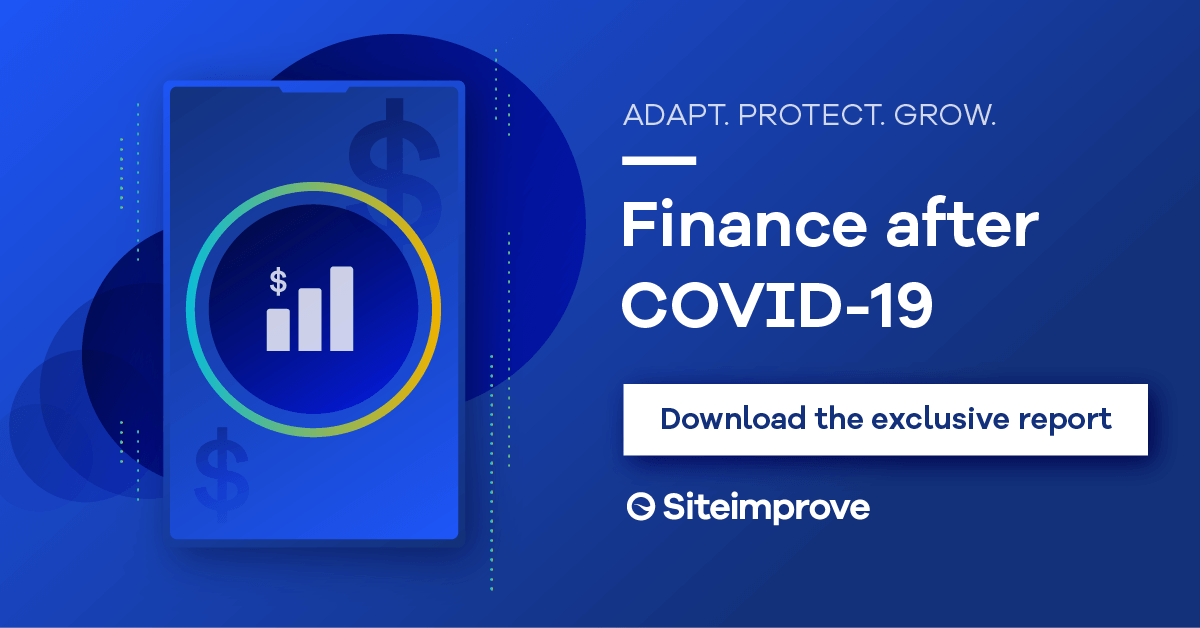Financial organizations must adapt their data strategy to preserve customer trust
- By Siteimprove - Jun 11, 2020 SEO Website Management Web Governance Data Privacy
The COVID-19 pandemic is one of the greatest threats to customer trust in the financial services since the 2008 financial crisis. However, for those willing to adapt their data governance strategy and embrace automation and data analytics, it could also provide an opportunity to gain a competitive advantage as the digitisation of the industry accelerates.
The crisis
Banks and insurance companies have had to manage a flurry of regulations designed to tackle the immediate challenges of COVID-19. Security checks and procedures that normally took place over a period of months were condensed into a matter of days. Not to mention that all of this had to be handled with a dispersed workforce. Now, not only are the stakes higher due to lower profitability, but organizations are under the same, if not tighter, scrutiny from regulators.
Online services continue to be placed under huge pressure as customers are forced to use digital channels. This has led to sensitive, personal data being removed from the secure environment of the branch and offices to be accessed online – to an extent never seen before. Being compliant and thoroughly protecting customer data has become a significant competitive advantage, as consumers are becoming acutely aware of what the misuse of their data means for their personal and professional lives. “Consumer trust has become the new battleground for digital success,” according to Cognizant.
The challenge
The COVID-19 crisis presents two huge problems:
- Financial organizations must adapt and optimize their online services to deal with a continual surge in online traffic. This requires them to strip away as many obstacles as possible between themselves and the customer (This is covered in detail in this blog: The online experience is critical for post-COVID-19 finance).
- Financial institutions should continue strengthening data governance and improving data quality at a time of economic uncertainty to comply with government regulations such as Consumer Data Right (CDR), APRA’s guidelines for Managing Data Risk (CPG 235), Australian Government Agencies Privacy Code, GDPR while keeping customer trust. Having an effective data governance approach has grown in importance as financial institutions, like most businesses today, face significant data overload and increased online traffic. While financial institutions need to process and store more personal data, there is an opportunity to drive innovation and unleash new opportunities.
Analytics
The surge in online traffic has provided more data than ever before, allowing institutions to gain deeper insights into their customers’ experiences, pain points, and how they can address those appropriately.
Quality assurance
In order to create a trustworthy brand experience and rank higher on search results, banks and insurers need to back up their reassurances with top-notch documentation that provides error-free, accessible and engaging content. Routinely audit website content, from blog posts and landing pages to videos and infographics, to provide the best brand experience at all times.
Risk mitigation
In order to remain compliant and preserve customer trust amidst turbulent policy changes (and when the majority of the workforce is working from home), SaaS solutions become paramount. With the right automated solution, financial organizations can seize control over the auditing of digital assets, freeing up their remote teams to focus on higher-level activity.
The opportunity
Vikram Singh-Mand, a leading industry consultant, says that “one positive to take from this pandemic is how [financial service organizations] are accelerating the move to true digitisation. How do we remove the restrictions of location on our businesses, on our customers and our processes? How do we provide customers the information that they need?” Industry leaders believe the COVID-19 crisis to be a period in which automation can be assessed, making this an opportunity for those organizations who can adapt their data governance processes and prepare for a digitized future landscape.
But how can companies begin to do that? Below, we’ve listed actionable steps you can take to get started (read this blog to dive deeper into more detail):
- Establish a reputation for protecting customer privacy. To truly turn customer trust into your competitive edge, your organization first needs to establish a reputation for protecting customer data and privacy. The other part of winning customer trust is to position yourself as a leader in your space on privacy and security.
- Ensure you handle privacy by design. Privacy by design is a foundational element of developing customer trust, because it will put data protection and privacy at the centre of your entire business operation. The privacy by design framework was established in 2009 and calls for data and user privacy to be taken into account through the entire product development process.
- Be proactively transparent. Don’t wait for laws and regulations to drag the truth out about how you process and store data. Instead, embrace transparency as a way to win customer loyalty.
- Create a culture of privacy ethics. For data privacy to sit at the core of your business, your employees must be thoroughly bought into data ethics and data privacy.
According to Accenture, a loss of trust will result in a customer switching to another bank or insurer at the drop of a hat – a strengthening of trust will keep a customer loyal to one for their entire life. By automating website compliance efforts and leveraging the right data governance and analytics tools, financial service organizations can both build customer trust and emerge from the COVID-19 crisis better equipped to be competitive in a digital landscape.
Learn more
It is possible to take a holistic approach via integrated solutions like Siteimprove, which gives enterprises complete visibility and control over the auditing of their customer-facing digital assets. Siteimprove empowers financial services by automating their data governance processes and enabling them to leverage customer data to make win-win propositions that benefit both the customer and the shareholder.
Book a 1-1 consultation to find out how Siteimprove’s holistic platform is helping the financial services retain customer trust and optimize their online experience.
Finance after Covid-19: Download the exclusive report

